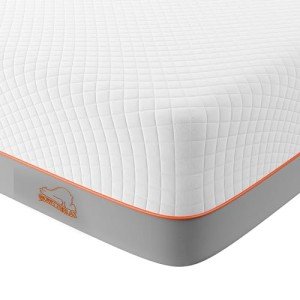The Benefits and Considerations of Memory Foam Mattresses
Memory foam mattresses have transformed the sleep industry, providing a distinct mix of convenience and support that adjusts to the contours of the body. Known for their exceptional ability to relieve pressure points, enhance convenience, and minimize motion transfer, these mattresses have actually ended up being a popular choice for many individuals. This post digs into the numerous elements of memory foam mattresses, including their benefits, considerations, and professional suggestions, assisting consumers make informed purchasing choices.
What is Memory Foam?
Memory foam, originally established by NASA in the 1960s, is a viscoelastic product that complies with the body shape of the sleeper. It is known for its unique residential or commercial properties: high density and sluggish recovery, allowing it to absorb weight and distribute pressure evenly while returning to its initial shape. This characteristic makes memory foam a perfect material for mattresses, offering support while reducing discomfort.
Benefits of Memory Foam Mattresses
Memory foam mattresses provide many advantages that add to better sleep quality:
- Pressure Relief: Memory foam contours to the shape of the body, alleviating pressure on sensitive areas such as hips, shoulders, and joints.
- Spinal Alignment: Proper spine positioning is vital for a good night's sleep. Memory foam mattresses offer balanced support, promoting a neutral spine position.
- Motion Isolation: Memory foam takes in and separates motion, making it an exceptional option for couples. Movement by one person usually does not interrupt the other, enabling both individuals to delight in undisturbed sleep.
- Hypoallergenic Properties: Many memory foam mattresses are resistant to irritants, allergen, and mold, making them a suitable choice for allergic reaction sufferers.
- Toughness: High-quality memory foam mattresses can last longer than standard spring mattresses, keeping their shape and support gradually.
Considerations When Choosing a Memory Foam Mattress
While memory foam mattresses have numerous benefits, potential buyers must also know particular considerations:
- Heat Retention: Memory foam can keep heat, making some sleepers feel too warm. Many contemporary mattresses integrate cooling innovations, such as gel-infused foam or breathable covers, to reduce this issue.
- Initial Odor: New memory foam mattresses can produce a preliminary chemical smell, commonly understood as off-gassing. This scent normally dissipates within a couple of days in a well-ventilated area.
- Weight: Memory foam mattresses can be heavy, making them difficult to move or establish without help.
- Firmness Variation: Different brand names and designs provide numerous firmness levels. It is important to test a mattress's feel before buying to ensure it meets personal comfort choices.
| Feature | Memory Foam | Standard Spring | Hybrid |
|---|---|---|---|
| Pressure Relief | Outstanding | Fair | Good |
| Motion Isolation | Exceptional | Poor | Great |
| Heat Retention | Moderate | Low | Low |
| Spinal Alignment | Excellent | Fair | Great |
| Resilience | Excellent | Moderate | Excellent |
Kinds Of Memory Foam Mattresses
When exploring memory foam mattresses, it is crucial to comprehend the different types readily available:
- Traditional Memory Foam: The original viscoelastic foam distinctively conforms to the body however might keep heat.
- Gel Memory Foam: Infused with gel particles, this foam provides a cooler sleeping surface area while maintaining contouring homes.
- Open-Cell Memory Foam: Designed with a structure that allows air to flow through, open-cell memory foam offers better breathability and reduces heat retention.
- Plant-Based Memory Foam: Made with specific natural plant oils, these foams go for a smaller sized ecological impact and can have much better breathability than traditional foam.
Tips for Selecting a Memory Foam Mattress
When selecting a memory foam mattress, consider the following ideas:
- Test Before You Buy: Try out the mattress in-store if possible or guarantee it comes with a sleep trial.
- Consider Your Sleep Position: Side sleepers may choose a softer firmness to reduce pressure on their shoulders and hips, while back and stomach sleepers might gain from a firmer mattress to keep back alignment.
- Check Warranty and Return Policy: A great warranty can secure your investment, and a versatile return policy offers assurance.
- Research study Brands: Look for reliable brand names with positive customer reviews and ratings from independent sources.
Regularly Asked Questions (FAQs)
1. How long do memory foam mattresses last?Most high-quality memory foam mattresses have a life expectancy of 10 to 15 years with appropriate care. 2. Can memory foam mattresses be
flipped?Most memory foam mattresses are designed
to be single-sided and do not need turning. However, rotating the mattress can assist with wear. 3. Are memory foam mattresses heavy?Yes, memory foam mattresses tend
to be heavier than traditional spring mattresses due to their thick products. 4. Can memory foam mattresses get too hot?Some people discover memory foam retains heat. Look for gel-infused or
open-cell foam options for more breathability. 5. Exist funding options for acquiring a memory foam mattress? Mattress With Memory Foam use financing plans, allowing customers to break the total expense into workable payments. Memory foam mattresses have actually become a prominent option for those seeking
convenience and support in their sleep environment. With a myriad of options and functions readily available, customers can
effectively find the best mattress to fulfill their requirements. Understanding the advantages, factors to consider, and various types of memory foam will gear up buyers with the knowledge to make a notified decision. As the need for quality sleep continues to increase, memory foam mattresses will unquestionably play a significant function in enhancing sleep health and total wellness.

